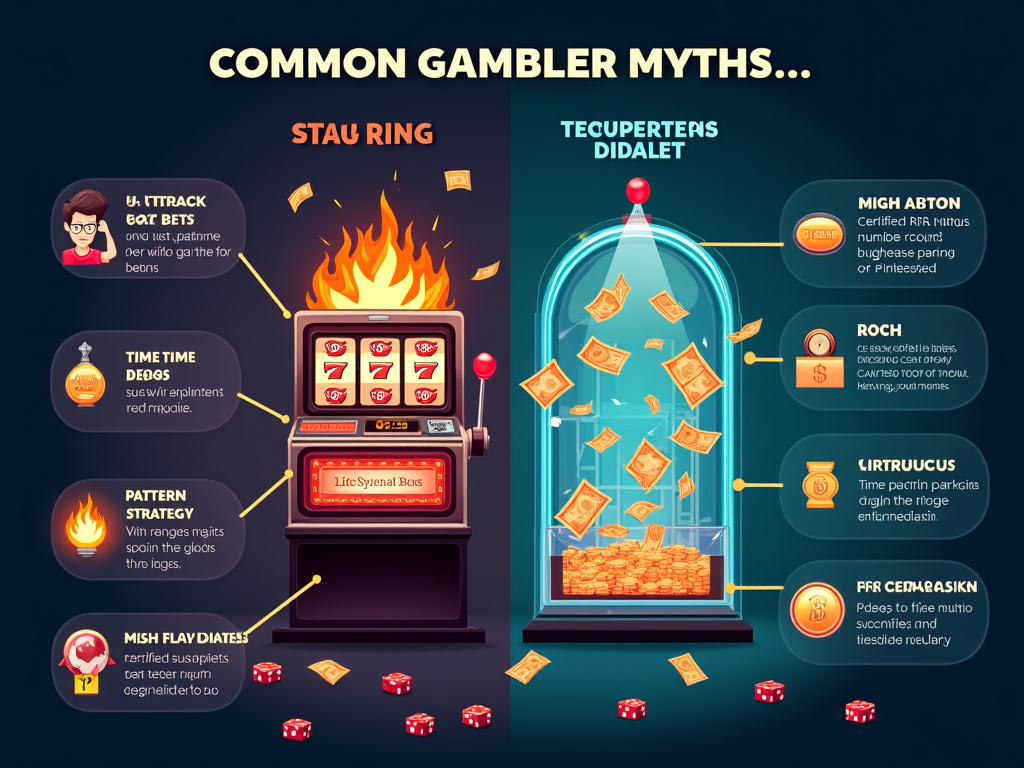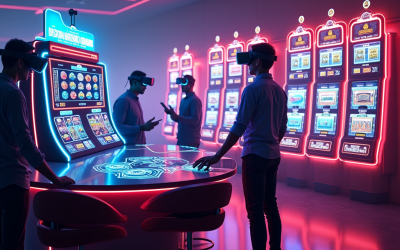Understanding RNGs in Digital Casino Gaming
Digital casino gaming relies heavily on Random Number Generators (RNGs) to ensure fair gameplay. These advanced systems produce thousands of random numbers every second, ensuring game outcomes are unpredictable and fair. RNGs are designed to replicate the randomness found in physical casino equipment, and they undergo strict testing and certification to maintain integrity.
Key Takeaways
- RNGs generate thousands of random numbers every second to determine game outcomes
- There are two main types: Pseudo-Random Number Generators (PRNG) and True Random Number Generators (TRNG)
- Independent testing labs verify RNG systems through extensive mathematical analysis
- Each game outcome is completely independent of previous results
- RNG-based games offer faster gameplay and lower minimum bets compared to live dealer options
How RNGs Replicate Casino Randomness
Modern RNG technology brings the authentic feel of a physical casino to the digital world. By generating sequences that are impossible to predict, these systems mimic activities like shuffling cards or spinning a roulette wheel. Renowned independent testing facilities subject RNGs to detailed mathematical evaluations, verifying their ability to deliver truly random outcomes.
This rigorous testing creates an environment where players can trust the fairness of any spin, deal, or roll. Certification ensures all outcomes mirror real-world gaming experiences, providing peace of mind and confidence in the software.
Advantages of RNG-Based Games
Games operated by RNGs significantly speed up the pace of play when compared to traditional table games. There is no need to wait for a dealer to shuffle or for other players to make decisions, resulting in a more efficient gaming experience. Additionally, the digital format allows game providers to offer lower minimum bets, making casino games accessible to a broader range of players.
True Randomness and Fair Play
A crucial aspect of RNG-driven games is that each result is independent of the others. There is no correlation between past and future outcomes, just as in a real casino setting. This ensures a consistent level of randomness and fairness in every session, regardless of previous results.
Advanced algorithms operate continuously in the background, providing instant results while upholding high standards of fairness. Players can be confident that behind every spin, roll, or deal is a thoroughly vetted system committed to authentic casino gameplay.
The Truth About How Casino Games Generate Random Results
Random Number Generators (RNGs) are at the core of every digital casino game’s fair play system. I’ll break down exactly how these sophisticated systems work and why they’re crucial for your gaming experience.
How RNGs Actually Work
Think of RNGs as digital dice rollers that operate at lightning speed. While playing online slots or virtual table games, these systems generate thousands of random numbers every second. Each number corresponds to a specific outcome — whether it’s the next card in blackjack or the symbols landing on your slot reels.
The beauty of RNGs lies in their pure randomness. Just like a physical deck of cards gives each card an equal chance of being drawn, RNGs ensure every possible outcome has the same probability of occurring. For instance, in a game of blackjack, each card has precisely the same chance of appearing as it would in a real casino.
Security and Regulation Standards
Casino RNGs must pass stringent testing protocols to ensure they’re truly random and tamper-proof. Here are the key aspects that gaming authorities check:
- Mathematical randomness of number sequences
- Unpredictability of future outcomes
- Equal distribution of results over time
- Protection against external manipulation
- Regular testing and certification cycles
These strict standards mean that whether you’re spinning the reels of different types of slot machines or playing cards, the outcomes are genuinely random and fair.
I’ve found that many players worry about RNGs being rigged, but the reality is these systems are under constant scrutiny by independent testing labs and regulatory bodies. This oversight ensures that your chances of winning are exactly as advertised — no better, no worse than they should be.
The RNG’s role extends beyond just generating random numbers. It’s integrated into the game’s core mechanics, determining everything from shuffle sequences in card games to the precise moment when bonus features trigger in slots. This comprehensive approach to randomness creates an authentic gaming experience that mirrors the unpredictability of physical casino games.

Two Types of RNG Systems That Power Modern Gambling
How PRNGs and TRNGs Shape Casino Gaming
I’ve found that Random Number Generators (RNGs) are central to creating fair and random outcomes in modern casino games. The two main types – Pseudo-Random Number Generators (PRNGs) and True Random Number Generators (TRNGs) – each serve specific purposes in digital gambling.
PRNGs stand as the primary choice for online slots and other casino games. They use complex mathematical formulas and seed values to create number sequences that determine game outcomes. These systems can generate billions of numbers before any sequence repeats, making them highly reliable for continuous gaming operations.
TRNGs take a different approach by using physical processes like atmospheric noise or radioactive decay to generate truly random numbers. While they’re considered more genuinely random than PRNGs, their slower processing speed means they’re typically reserved for creating initial seed values rather than powering moment-to-moment gameplay.
The seed values used in PRNGs come from various unpredictable sources, such as:
- System clock millisecond readings
- Mouse movements and keyboard inputs
- Network traffic patterns
- Hardware temperature fluctuations
I’ve noticed that while both systems have their strengths, PRNGs dominate the casino industry thanks to their perfect balance of randomness and operational efficiency. They’re particularly effective in popular table games like blackjack, where quick results are essential for smooth gameplay.
The mathematical precision of PRNGs ensures that every spin, deal, or roll maintains complete independence from previous outcomes. This independence mirrors the randomness you’d expect from physical casino equipment, but with added speed and reliability that digital platforms require for seamless gaming experiences.
How Popular Casino Games Use RNG Technology
Random Number Generators form the core of modern digital casino games, creating billions of possible combinations to ensure fair and unpredictable results. Casino games rely on sophisticated RNG systems to replicate the randomness found in their physical counterparts.
RNG Implementation Across Different Games
In online slot machines, RNG technology works at lightning speed, producing thousands of random numbers every second. These numbers connect directly to specific positions on the virtual reels. When you hit the spin button, the RNG instantly locks in a number sequence that determines where each reel will stop. The spinning animation you see is just for show – your result was decided the moment you pressed play.
For digital blackjack games, RNGs create virtual decks that mirror the randomness of physical card shuffling. Before each hand begins, the system generates a complete shuffle of all 52 cards. This process happens in milliseconds, ensuring every deal is random and independent of previous hands.
Digital roulette takes a direct approach with RNG implementation. The system generates numbers that correspond to specific pocket positions on the wheel – 0 through 36 for European roulette, and an additional 00 for American roulette. While you might watch the ball circle the wheel, this visual element is purely cosmetic. The RNG has already determined where your bet will land.
Here’s how RNG technology shapes different casino games:
- Slot Machines: Maps random numbers to reel symbols and positions
- Card Games: Creates shuffled virtual decks before dealing
- Roulette: Generates pocket numbers instantly
- Video Poker: Shuffles virtual cards for each new hand
- Dice Games: Produces random number combinations to simulate dice rolls
The instant nature of RNG technology means there’s no delay between your action and the outcome determination. Any animations or visual effects serve to build excitement and create an engaging experience, but they don’t impact the actual result. This system ensures that every game round stands alone, independent of previous or future plays.
Understanding how slots and other games work helps players recognize that no pattern or timing strategy can influence these truly random outcomes. The RNG keeps running continuously, even when nobody’s playing, generating new number sequences that will be used for future game rounds.
In card-based games like blackjack, the RNG shuffles the virtual deck between every hand, unlike physical casinos where multiple hands might be played from the same shuffle. This constant reshuffling provides an added layer of randomness and fairness to the gaming experience.
Inside the Testing Labs That Verify Casino Fairness
Leading Testing Laboratories and Their Role
Independent testing labs serve as the guardians of fair play in online gaming. I’ve found that respected organizations like eCOGRA, iTech Labs, and GLI stand at the forefront of RNG verification, ensuring that casino games deliver genuine randomized results for every spin, deal, and shuffle.
These labs don’t just run basic checks – they perform extensive testing that analyzes billions of generated numbers. This thorough approach helps identify any patterns or biases that could compromise the fairness of online slots and table games.
Testing Methods and Regulatory Requirements
The testing process combines several sophisticated statistical methods to verify true randomness:
- Chi-Square tests examine the distribution of numbers to confirm they match expected probability patterns
- Diehard tests put the RNG through a series of complex mathematical assessments
- The NIST test suite provides additional verification through standardized testing protocols
Major gambling authorities like the UK Gambling Commission (UKGC) and Malta Gaming Authority (MGA) require these rigorous testing procedures before granting licenses. When you spot official testing lab badges on a casino’s website, it means their RNG systems have passed these strict evaluations.
These certifications are particularly important for popular casino games like blackjack, where fair dealing is essential for maintaining game integrity. Each certification confirms that the casino’s RNG system successfully generates unpredictable results that mirror the odds you’d find in physical casino games.
I’ve noticed that the most trustworthy online casinos proudly display their testing certificates, typically in the footer of their website or their fair gaming policy section. These badges serve as a quick way to verify that independent experts have confirmed the casino’s commitment to fair play through comprehensive RNG testing.

Common RNG Myths vs Reality
Let’s clear up some stubborn misconceptions about Random Number Generators (RNGs) in online casino games. I’ve encountered many players who hold onto beliefs that simply don’t match the technical reality of how these systems work.
Debunking Popular RNG Misconceptions
Hot and cold streaks are among the most persistent myths in gambling. While playing online slots, you might notice several wins or losses in a row and think the machine is “hot” or “due for a payout.” However, each spin is completely independent—like flipping a coin, previous results don’t influence what happens next.
Here are the key myths I regularly encounter and the reality behind them:
- Casino Control Myth: Many players believe casinos can adjust payouts whenever they want. The truth is, RNG systems require strict certification and testing. Any changes would require a complete recertification process, making on-the-fly adjustments impossible.
- Timing Tactics: Some players swear by clicking at specific times or using particular betting patterns. In reality, RNGs generate thousands of numbers per second—your timing has zero impact on the outcome.
- Pattern Recognition: Looking for patterns in previous results, especially in games like blackjack, is pointless. Each new hand or spin starts fresh, with no memory of what happened before.
- Return to Player Misconceptions: The RTP percentage isn’t a guarantee for short-term sessions. If a slot has a 96% RTP, this doesn’t mean you’ll get back $96 for every $100 you spend. This percentage only becomes meaningful over millions of plays.
I find these myths particularly prevalent in slot games, where the randomness is often misunderstood. The RNG continuously generates numbers, regardless of whether someone is playing or not. This means there’s no way to predict or influence when a winning combination might appear.
Think of RNGs as digital dice—each roll is fresh and independent. Just as throwing three sixes in a row doesn’t make another six more or less likely, previous game outcomes don’t affect future results. This randomness is what makes casino games fair and unpredictable, preventing both players and operators from manipulating results.
The certification process for RNGs is incredibly strict. Independent testing laboratories verify that these systems meet randomness standards and operate exactly as advertised. This means that whether you’re playing classic table games or modern video slots, the outcomes are genuinely random and fair.
This randomness is what creates the excitement and unpredictability that makes casino games entertaining. Understanding these realities helps make more informed decisions about gaming strategies and bankroll management, rather than relying on misconceptions that could lead to poor choices.

RNG vs Live Dealer: Choosing Your Gaming Experience
RNG-Powered Casino Games
I’ve found that RNG-based games provide a distinct set of advantages that make them popular with many players. These games run on sophisticated computer algorithms that create truly random outcomes for each spin, deal, or game round. The speed and efficiency of digital casino games make them perfect for players who prefer a faster-paced experience.
Here’s what makes RNG games stand out:
- Quick gameplay with instant results
- Lower minimum betting limits, perfect for beginners
- Wide variety of game variations and themes
- Available 24/7 without waiting for seats
- Perfect for practicing strategies at your own pace
Live Dealer Gaming Experience
Live dealer games bring the authentic casino atmosphere right to your screen. I particularly appreciate how these games blend traditional casino elements with modern technology. When you play live dealer blackjack or other table games, you’re watching real cards being dealt by professional dealers in real-time.
The social aspect of live dealer games creates an immersive experience that RNG games can’t match. You can chat with dealers and other players, creating a community feel similar to land-based casinos. The physical cards, wheels, and dice used in these games provide a tangible source of randomness that some players find more trustworthy than computer algorithms.
Live dealer games typically have higher minimum bets than their RNG counterparts, reflecting the additional overhead costs of running a live studio. The pace is also naturally slower, as dealers must physically handle cards and chips, making these games better suited for players who enjoy a more relaxed gaming session.
Both formats undergo strict testing and certification to ensure fairness. RNG games use certified software that’s regularly audited by independent testing labs, while live dealer games follow standard casino procedures with physical equipment and trained professionals. I’ve noticed that some players prefer seeing actual cards being shuffled, while others trust the efficiency and precision of RNG systems.
The choice between RNG and live dealer games often comes down to personal gaming style. If you value speed and convenience, RNG games might be your best bet. However, if you’re seeking an authentic casino experience with human interaction, live dealer games could be more your speed. You can even mix both options, using RNG-based slots for quick gaming sessions and switching to live dealer tables when you want that genuine casino atmosphere.

Sources:
eCOGRA – “Standards”
Gaming Laboratories International (GLI) – “GLI Standards”
iTech Labs – “Testing Services”
UK Gambling Commission (UKGC) – “Licensees”
Malta Gaming Authority (MGA) – “Gaming Standards”
Scientific American – “How Slot Machines Work”
HowStuffWorks – “Random Number Generator”





